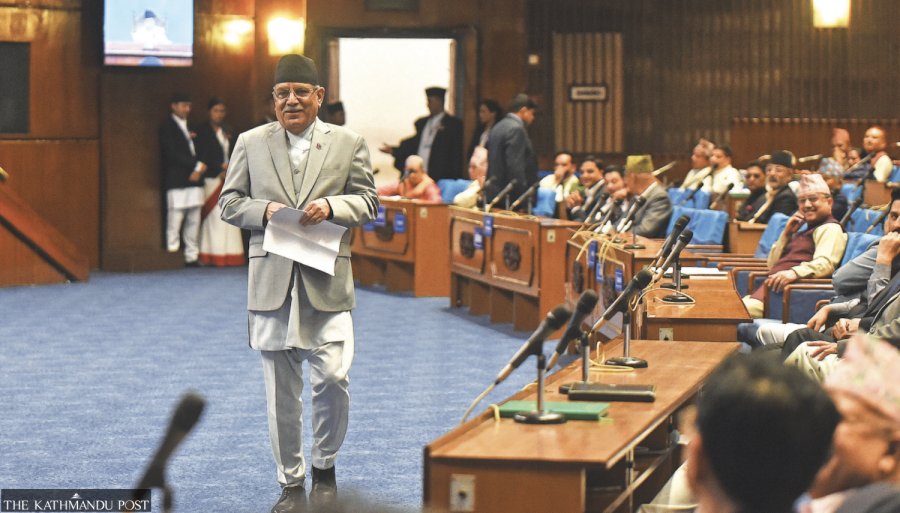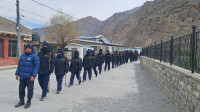National
Prime Minister Dahal loses vote of confidence in House
Dahal lost his position as only 63 lawmakers gave him the vote of confidence, less than half the majority figure of 138 in the 275-member House.
Binod Ghimire
Prime Minister Pushpa Kamal Dahal lost a vote of confidence at the House of Representatives on Friday, prompting President Ramchandra Paudel to trigger a new government formation process and KP Sharma Oli of the CPN-UML to claim the prime minister’s position with the backing of the Nepali Congress.
Dahal lost his position as only 63 lawmakers gave him the vote of confidence, less than half the majority figure of 138 in the 275-member House.
Of the 258 present, 194 lawmakers voted against the motion while one stayed neutral. Apart from the support of his own CPN (Maoist Centre), Dahal retained the support of only two parties in his government—the Rastriya Swatantra Party and the CPN (Unified Socialist). Other coalition partners stood against him.
The prime minister saw a huge erosion in support from his first vote of confidence in January last year when he enjoyed an overwhelming support of over 98 percent of lawmakers. The support on Friday shrank to 22 percent of lawmakers, in the span of less than a year and half.
Dahal had a constitutional obligation to face the vote of confidence after the CPN-UML, the largest party in the Dahal government, withdrew its support on July 3 after an agreement to form a new government together with the Nepali Congress.
The country’s largest communist party forged a deal with the Congress on July 1 to replace the Dahal government.
Rejection of the motion was a given with the country’s two largest parties—the Congress and the UML—partnered with some fringe parties against the government and the prime minister was aware of it.
Yet the frustration at losing the prime ministerial berth was visible in his address to the House on Friday. He claimed that the two-party deal was not spontaneous but was well orchestrated by “somebody else”.
“You didn’t unite on your own, someone else did [brought you together],” he said while addressing the House. “Why would the deal between the two largest parties be signed in a dark room if it was done with a good intent?”
The prime minister spent a half of his 80-minute speech presenting the achievements of his government made in a year and half since its formation in December 2022. The other half went to lashing out at the Congress-UML partnership.
As the leader from both parties claim, their yet-to-be-disclosed deal is grounded in two themes: ensuring stability to drive the country on the path of prosperity and amending the constitution for the country’s benefit. Through his address, Dahal gave a clear message that his party would make criticising these issues its primary task.
“It is an open secret that you [the Congress and the UML] want to go back to 1990 in the name of stability. You are trying to remove inclusive principles and proportional representation in the name of stability,” said the prime minister. “Was there stability when you two parties had the system of your choice? Are you not the same parties that formed 15 governments between 1991 and 2005?”
He accused the Congress and the UML of conspiring against the marginalised and underprivileged communities by amending the constitution. Claiming that the two traditional parties want to opt for electing the lower house fully under the first-past-the-post (FPTP) and making the National Assembly fully inclusive. This move according to Dahal is an attempt to deprive the people from minority and underprivileged communities from becoming the prime minister.
Only a member of the House of Representatives is eligible to become the prime minister as per the constitution.
“People are fully aware. Nobody can revoke the rights achieved through huge struggle and sacrifice,” said Dahal, warning multiple times that the country would head towards another conflict if the constitution was amended as planned by the two parties. The Maoist supremo also dared the two parties to amend the constitution without his party’s support.
Though securing two-thirds majority in the lower house without the support of the Maoist Centre is possible, that is not the case in the upper house. With 17 seats excluding the chairperson, the Maoist Centre is the largest party in the National Assembly. An amendment to the constitution must be endorsed by the two-thirds majority of both chambers of Parliament.
Dahal pointed out that, prior to the second people’s movement in 2006, Dalits’ representation was close to zero, women’s representation was hovering around 5 percent while the representation of janajatis and Madheshi’s was token. Their representation in state organs increased significantly after the Maoist party entered Parliament through the reinstated House of Representatives, he said. The inclusive provisions were later enshrined in the Interim Constitution first in 2007 and in the Constitution of Nepal drafted by the Constituent Assembly in 2015.
The prime minister, however, said his party was ready for an amendment to the constitution not in squeezing proportional representation but for ensuring 50 percent women’s representation in the state machinery, increasing the representation of other marginalised communities and having a directly elected executive head of the country.
The Maoist Centre has long been pushing for the directly elected executive head, right since the time of the Constituent Assembly. But, as the Congress refused to ditch the parliamentary system, its demand couldn’t materialise.
Dahal was critical in his Friday speech towards the Congress as well but not as bitter as towards the UML and its chairman Oli. He said nobody can beat Oli in conspiracy. Stating that he agreed to switch the ruling partner from the Congress to the UML because Oli argued that if not united the Maoist Centre and the UML would meet the fate of the communist movement in West Bengal. “I believed that time changes people but I was wrong. Some people can never shed their ego,” said Dahal, hinting at Oli.
Countering the UML’s call for him to resign on moral grounds, Dahal said, “Those who are habituated to dissolve parliament and their supporters tried to teach me moral lessons. I just want to stress that the CPN (Maoist Centre) has the highest level of investment in this constitution,” he said, asking the Congress to be vigilant that Oli can deceive it too.
In turn, along with the UML and the Nepali Congress, other party lawmakers also countered Dahal. Speaking after him, Congress chief whip Ramesh Lekhak said the constitution would be amended without distorting its inclusive spirit. “You have every quality to become the opposition leader. It was our mistake to make you the prime minister repeatedly,” he said.
Also addressing the House, UML lawmaker Yogesh Bhattarai asked Dahal to stop politics in the name of Dalits, janajatis and other marginalised communities. “Do you know what is the fate of Magars from Rolpa who waged the war for you? Do you have any idea what your Dalit supporters are doing these days?” Bhattarai asked. “You are in illusion, if you still think you can spark a conflict through provocative statements.”
Gyan Bahadur Shahi, chief whip of the Rastriya Swatantra Party, was one of those who accused Dahal of not doing enough on his part when it comes to giving opportunity to those from dalit and indigenous communities.
“Why didn’t you promote a leader from the adivasi community as the party chief just like we in the RPP have done,” Shahi said. “Why didn’t you appoint at least one dalit minister in your Cabinet?”




 23.39°C Kathmandu
23.39°C Kathmandu














